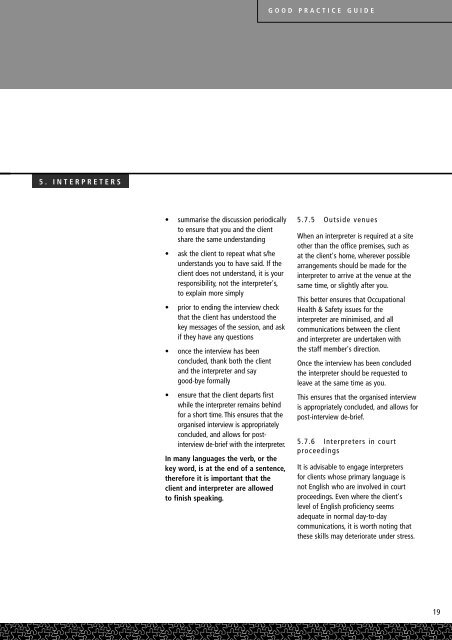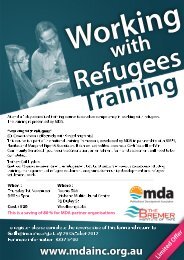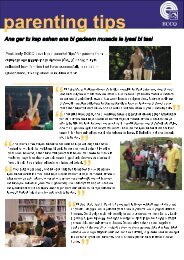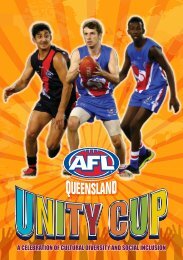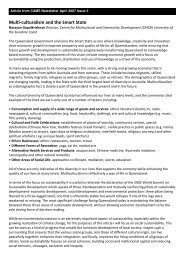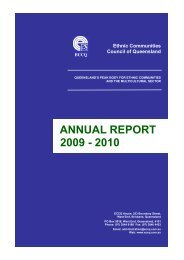Good Practice Guide
CALD Good practice guide
CALD Good practice guide
You also want an ePaper? Increase the reach of your titles
YUMPU automatically turns print PDFs into web optimized ePapers that Google loves.
GOOD PRACTICE GUIDE<br />
5. INTERPRETERS<br />
• summarise the discussion periodically<br />
to ensure that you and the client<br />
share the same understanding<br />
• ask the client to repeat what s/he<br />
understands you to have said. If the<br />
client does not understand, it is your<br />
responsibility, not the interpreter's,<br />
to explain more simply<br />
• prior to ending the interview check<br />
that the client has understood the<br />
key messages of the session, and ask<br />
if they have any questions<br />
• once the interview has been<br />
concluded, thank both the client<br />
and the interpreter and say<br />
good-bye formally<br />
• ensure that the client departs first<br />
while the interpreter remains behind<br />
for a short time. This ensures that the<br />
organised interview is appropriately<br />
concluded, and allows for postinterview<br />
de-brief with the interpreter.<br />
In many languages the verb, or the<br />
key word, is at the end of a sentence,<br />
therefore it is important that the<br />
client and interpreter are allowed<br />
to finish speaking.<br />
5.7.5 Outside venues<br />
When an interpreter is required at a site<br />
other than the office premises, such as<br />
at the client's home, wherever possible<br />
arrangements should be made for the<br />
interpreter to arrive at the venue at the<br />
same time, or slightly after you.<br />
This better ensures that Occupational<br />
Health & Safety issues for the<br />
interpreter are minimised, and all<br />
communications between the client<br />
and interpreter are undertaken with<br />
the staff member's direction.<br />
Once the interview has been concluded<br />
the interpreter should be requested to<br />
leave at the same time as you.<br />
This ensures that the organised interview<br />
is appropriately concluded, and allows for<br />
post-interview de-brief.<br />
5.7.6 Interpreters in court<br />
proceedings<br />
It is advisable to engage interpreters<br />
for clients whose primary language is<br />
not English who are involved in court<br />
proceedings. Even where the client's<br />
level of English proficiency seems<br />
adequate in normal day-to-day<br />
communications, it is worth noting that<br />
these skills may deteriorate under stress.<br />
19


